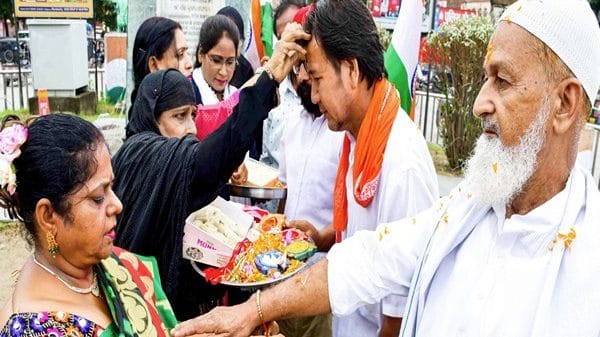Thank you dear subscribers, we are overwhelmed with your response.
Your Turn is a unique section from ThePrint featuring points of view from its subscribers. If you are a subscriber, have a point of view, please send it to us. If not, do subscribe here: https://theprint.in/subscribe/
Throughout history, many nations have cultivated their unique forms of exceptionalism—be it American exceptionalism (Pax Americana), British exceptionalism (Pax Britannia), or even modern-day Chinese exceptionalism, driven by aspirations to overcome historical humiliation and reclaim global prominence. Where does India stand in this paradigm of national identity?
India’s story is a complex tapestry of millennia-old greatness punctuated by a thousand years of humiliation. Unlike others, however, the Indian narrative is marked not by pride in its past but by an enduring “Indian Inferiorism”—a deep-seated shame about its own civilization, cultivated over generations.
A Civilizational Legacy Undermined
“Those who cannot remember the past are condemned to repeat it.” – George Santaya.
India’s history is a testament to the rise and fall of powerful empires—the Harappan civilization, the Mauryas, the Marathas—all rooted in the vibrant Vedic ethos. Yet, the last millennium saw waves of foreign domination, from Islamic invasions to British colonial rule, each leaving deep scars on India’s social, economic, and cultural fabric.
Islamic invaders razed cities, temples, and universities, systematically dismantling India’s institutions while slaughtering its warrior and priestly classes. Despite the atrocities committed in the name of eradicating “idolatry,” historical narratives have whitewashed these events, focusing instead on the achievements of conquerors like the Mughals and Ghazni while sidelining defenders like Prithviraj Chauhan, the Vijayanagar Empire, and the Marathas.
The British took a more insidious approach, replacing outright destruction with “divid and rule” to systematically extract resources and the indoctrinate and entire generation of English-educated class. This methodical brainwashing fostered a belief in the inferiority of Indian civilization, reducing India’s share of the global economy to a mere 4% by 1949, from its pre-colonial heights as an economic superpower.
The Problem with Indian Secularism
Post-independence India compounded the issue by embracing a form of “pseudo-secularism” that glorified invaders while neglecting their victims. The legacy of Hindu subjugation was swept under the carpet in the name of national unity. Successive governments, instead of confronting these historical truths, allowed the distortion of history to persist. Students are taught the Mughal family tree by heart while those of Gupta’s, cholas, Marathas and Sikhs are willfully put in as foot notes
Ironically, some descendants of forcibly converted Hindus now defend the actions of Islamic invaders as medieval necessities, refusing to condemn their brutality. The Hindu community itself has been fragmented into castes through divisive policies like reservations, which have entrenched divisions and hindered the unification necessary for reclaiming India’s cultural identity.
A Call for Truth and Reconciliation
To heal as a nation and restore its civilizational ethos, India must undertake a “Commission of Truth and Reconciliation,” akin to South Africa’s post-apartheid efforts or Israel’s remembrance of the Holocaust. This initiative should:
- Document Historical Injustices: Establish museums and educational programs to preserve the memory of those who suffered under Islamic and British rule. The same has to be taught in schools.
- Encourage Introspection Among Communities: Indian Muslims must be encouraged to respect their pre-Islamic heritage, disavow historical invaders, and relinquish temple lands seized during conquests.
- Rebuild Cultural Heritage: Restoring India’s temples, cities, and cultural sites to their former glory is crucial for fostering national pride. Key cultural sites, particularly temples in Sapta Moksha Puris like Kashi, Mathura, and Ujjain, must be restored. Sanskrit, the ancient lingua franca, should be revived as a national language to reconnect with India’s civilizational texts such as the Vedas and Upanishads
- Revive Indian Icons and Symbols: Replace colonial and invader names with Indian icons like Rama, Krishna, Shivaji, and motifs like the lotus and Sri Yantra to reinforce cultural pride.Toward Indian Exceptionalism
The Erstwhile Congress government was downright traitorous and followed the divide and rule policy for vote back purposes and let the wounds of the past fester while current BJP government has paid lip service to this cause and did nothing in the last 11 years India’s journey to becoming a superpower cannot be rooted in shame or division.
Hindus must rise above caste and reservation politics, and Muslims must embrace India’s civilizational ethos over allegiance to the global Ummah.
Only by uniting as a people under one Civilizational Umbrella and reclaiming the nation’s rich heritage while preserving the best of the western civilization (Democracy and English Language) can India create a narrative of “Indian exceptionalism”—one that aspires not just to power but to the revival of a civilization that has long inspired humanity.
Let us not allow the mistakes of the past to define our children’s future. Instead, let us craft a destiny rooted in pride, truth, and a shared commitment to India’s greatness.
These pieces are being published as they have been received—they have not been edited/fact-checked by ThePrint.


